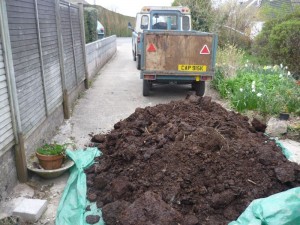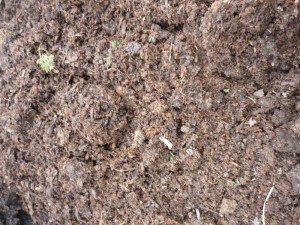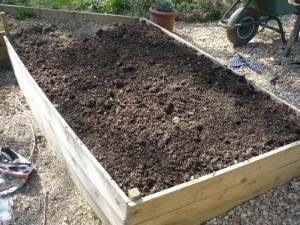16 Apr 2010
Compost Porn for the Discerning Gardener
 As regular readers will know, I get very excited about good compost. It is one of the most exquisite things on earth. Words like ‘crumbly’, ‘friable’, ‘rich’, ‘humus’ and ‘moist’ verge on the erotic for me, and from comments posted here previously, I know many of your share my enthusiasm for the ‘brown stuff’. Therefore, the pictures I am about to show you verge on being ‘compost porn’, an entirely wholesome way to set the collective pulse racing. A bit late in the season, I finally tracked down a local farmer with well rotted muck for my raised beds. Often such a request results in a load of barely rotted, nettle-filled stuff you have to leave to compost for a couple of years. However, I had little idea what exquisite compost fate had in store.
As regular readers will know, I get very excited about good compost. It is one of the most exquisite things on earth. Words like ‘crumbly’, ‘friable’, ‘rich’, ‘humus’ and ‘moist’ verge on the erotic for me, and from comments posted here previously, I know many of your share my enthusiasm for the ‘brown stuff’. Therefore, the pictures I am about to show you verge on being ‘compost porn’, an entirely wholesome way to set the collective pulse racing. A bit late in the season, I finally tracked down a local farmer with well rotted muck for my raised beds. Often such a request results in a load of barely rotted, nettle-filled stuff you have to leave to compost for a couple of years. However, I had little idea what exquisite compost fate had in store.
 The story goes that this guy lived next door to a huge stables, and had stacked their manure for them in big heaps every year for the past 30 years. Some of it he had on his farm, a heap of some 20 years of age. A far bigger one stood on the main farm and he had a deal with them whereby he could sell it to local gardeners. Then the stables was brought it, and the new owners didn’t share his passion for muck, and spread the lot around the farm. All that remained was the small amount he had on his farm, which is now nearly all gone. I got a good trailer load for £40, and what arrived is just gorgeous.
The story goes that this guy lived next door to a huge stables, and had stacked their manure for them in big heaps every year for the past 30 years. Some of it he had on his farm, a heap of some 20 years of age. A far bigger one stood on the main farm and he had a deal with them whereby he could sell it to local gardeners. Then the stables was brought it, and the new owners didn’t share his passion for muck, and spread the lot around the farm. All that remained was the small amount he had on his farm, which is now nearly all gone. I got a good trailer load for £40, and what arrived is just gorgeous.
It poured from the trailer, crumbly, dark and delicious, moist and sweet-smelling into a big pile which is gradually being transported onto the garden beds (see left). Compared to my most recent manure-gathering experience, where I shovelled semi-rotted muck into sacks in the pouring rain and returned home exhausted, sodden and filthy, only to be met by my neighbour who gave me the phone number of the guy with this muck (might have mentioned before I set off!), this was compost heaven. So anyway, here it is… delicious. I just hope my veggies agree.

Ed
16 Apr 3:41pm
golddust
Carin Schwartz
16 Apr 4:46pm
Rob, I fully and completely share your enthusiasm. Compost is a matter of life and death. We choose to either send our compostable waste to landfill = death for the planet, OR we make rich, gorgeous, nutritious, negativecarbon, mineral rich stunning COMPOST.
I have just become the only Master Composter Coordinator that we have in Moray (for this year) and I’m rapidly recruiting volunteers to help spread the message of how useful compost is to all the households in Forres, as part of Transition Town Forres ongoing endeavours to lower our carbon here. The program is run by a government sposored scheme under Zero Waste Scotland.
Thank you for posting these delicious pictures which will hopefully get even more of us going on this deeply satisfying task.
All the best
Carin
Lia Leendertz
16 Apr 5:02pm
I had a similar delivery last week, not of farmer’s best, but of council compost. Looks like lovely stuff (apart from the inevitable odd shards of glass, hey ho). Much (ahem) fun carting it through the house to the back garden.
Out of interest, it is not our own council waste from our own brown bins, as here in Bristol we are apparently above composting our own kitchen peelings, and instead truck it to Dorset. I had to go to a neighbouring council for some of theirs.
John Mason
17 Apr 12:37pm
Looks great, Rob!
A hot tip for those living in sheep-country is to see if you can find an old lambing-barn that’s not been cleared out for years. This I did last year, and the stuff was amazing – it was necessary to use a pickaxe to get into it, the stratified layers coming up like plates of chipboard! It is still breaking up now so it is a slow-release process, which the plants seem quite happy with, as are the worms!
The other thing I do apart from weeds, cardboard, grass cuttings and kitchen debris is to collect washed-up seaweed when I’m at the beach – it can be heaped-up in tonnes after a storm – and put a good layer into the compost heap every so often. It’s rich in minerals and composts down nicely!
Cheers – John
Steve Last
17 Apr 8:48pm
Rob,
Very, very exciting!
As a fellow compost aficionado, you may be interested in The Compost Appreciation Society on Facebook. Extreme composting from around the world . . . Does it get any better?
Best wishes
Steve
Andrew
17 Apr 11:41pm
I share the joy. Today I procured a 4′ X 4 ‘ X 3.5’ load of well-rotted horse manure. To some of it we shall add leaves and scraps to make even more good stuff. I’ll enjoy watching it work. Composting is a bit like meditating . . . cooking raw material with attention until it becomes eminently serviceable.
Mari Shackell
18 Apr 2:14pm
I built my first compost heap when I was 12 years old and have been quietly decomposing ever since. I am a founder member of the Whitstable Rotters and thoroughly recommend this totally therapeutic and satisfying outdoor hobby.
Mark Forskitt
18 Apr 4:44pm
I agree making compost can be quite theraputic. it is a cornerstone of any sustainable growing system.
I have been looking at the population growth projections, world food production estimates, the strains on irrigation sources, and the overdependence of agri business on oil, and can only conclude we deperately, urgently need a world food descent plan.
Tim Taylor
18 Apr 8:23pm
I was inspired to begin organic gardening when I took a course focused on compost and soil at the Greater Victoria Compost Education Centre (http://compost.bc.ca). The Centre is small, but it has helped ween many folks on Vancouver Island off of fossil fuel based fertilizers by demonstrating many different techniques for backyard handling of organic waste.
In the age of declining availability of water and non-renewable ingredients of fertilizers, the next logical step is for folks to accept that composting can be the most safe and practical way to convert human excrement into usable compost (humanure) without contaminating precious fresh water supplies. Check out the Humanure Handbook for more info: http://www.jenkinspublishing.com/humanure.html
Happy composting!
Cheers,
Tim
Andrew
19 Apr 12:39pm
One couple I know create humanure in their suburban basement . . . they have what they call a “com-poo-st” pile. This is very hard for most folks to “get their head around”.
Easier is the idea of an outhouse Surprisingly, where I live in Ontario, Canada, where regulations tightly govern building, outdoor privies are unregulated – saving the need for extremely expensive septic systems. The resulting compoost / humanure could be dug up after a suitable time and applied to the garden in the fall, or to an existing compost pile for more cooking.
This seems very doable to me. Could they become fashion items in suburbs? Really I think they could!
Darren Woodiwiss
19 Apr 1:35pm
Ah the holy grail, I have been looking to get access to a decent pile for ages. The last one I went to the guy told me to drive down a lane a get the manure from there. This I did only to find out it was someones back garden and they did not welcome the intrusion :o(
I have tried some of my local councils compost, spread it around and went on holiday for a week only to come back to a new lawn on my vegi plot. Worst thing was that it was nicer than my lawn in the garden.
Tim Taylor
19 Apr 3:51pm
Hot compost is definitely required to cook human pathogens and weed seeds out of the finished compost. Heat is created when thermophilic microorganisms metabolize organic waste. They can be encouraged by making sure you have the right mix of carbons (browns – like leaves) and nitrogen (greens – like grass).
Alternatively, time (about 2 years) can be a substitute for heat to make sure that the pathogen levels are safe and weed seeds have germinated and gone to the pile 😉
As for urban applications of Humanure systems becoming fashionable, I hope so! BUT, I would like to have by-laws guiding enthusiasm.
I like the idea of the basement com-poo-st system, but I don’t have the basement to do it in, so I am going to use a 3-bin system.
My main concern is to make sure that the system is covered and I have taken steps to control potential runoff during our winter rainy season. I will be using a trenches (dug in the clay and rock). I definitely do not want any effluent running off into a near by stream!
When completed and running, I hope to present my system as a model to my local municipality, so by-laws can be drafted.
One urban homesteader I know has designed a bin system that will use concrete and cinder blocks as impermeable barrier and he is in a downtown neighbourhood.
Cheers,
Tim
Some more references:
http://compost.bc.ca/learn/howto.htm
Jane Buttigieg
20 Apr 11:32am
Great post and lots of interesting comments. I’ve been making compost for years, long before I understood anything about peak oil. I used to use it for flowers and as a general garden soil improver, but now I know how to grow some vegetables, there is a whole new significance to the crumbly brown stuff that falls out the bottom of my compost bin in spring.
I am in an urban area, (Bristol, UK) do not have an allotment and am only growing in a small back garden and on the sunny strip of concrete in front of my house, but last year I produced a great crop of cucumbers, lettuces, beetroot, courgettes, chilli peppers and herbs, and I know that much of my success was due to the quality of my compost. I love its texture and smell and am always pleased at the amount of worms and worm eggs in it. One useful thing I learned on an organic vegetable growing course I attended last year was not to use it to fill an entire bed, pot etc (I couldn’t make that much anyway) but to use it as a feed, mixing it on the surface of the soil or compost already in the pot or bed. I have also heard that ordinary home made compost is richer in nutrients than manure. Anyone know if this is true?